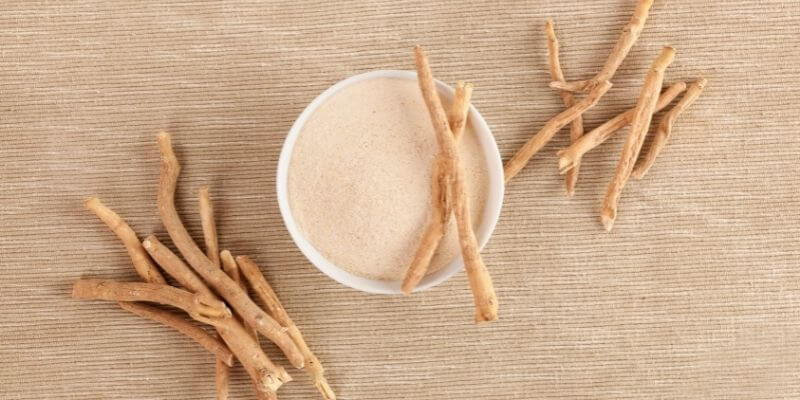ASHWAGANDHA: THE HEALING OF MIND AND BODY
Learn more about the main benefits, how to take it and what effect ashwagandha can have on your body as a medicinal herb. Did you know that ashwagandha is also known as sleeping berry or winter cherry?

WHAT IS ASHWAGANDHA (WITHANIA SOMNIFERA)?
Ashwagandha (Withania somnifera) is a medicinal plant from the nightshade family. The versatile benefits of ashwagandha make it a popular herb in the Ayurvedic tradition and in naturopathy. In ancient Indian scriptures, it is also said to be a miracle plant.
But what is ashwagandha good for?
Ashwagandha is known as an adaptogen, meaning it can help the body manage stress. Among other effects, chronic stress can lower testosterone levels. By reducing stress, ashwagandha may therefore indirectly help to increase testosterone levels. Other direct effects are also currently the subject of studies.
In addition, it is said that ashwagandha has a positive effect on sleep, which is why it is also known as the sleep berry or winter cherry.
Ashwagandha is known as an adaptogen, meaning it can help the body manage stress. Among other effects, chronic stress can lower testosterone levels. By reducing stress, ashwagandha may therefore indirectly help to increase testosterone levels. Other direct effects are also currently the subject of studies.
Even though ashwagandha is often referred to as Indian ginseng, it should not be confused with the medicinal plant Panax ginseng. Both are adaptogens, but still different medicinal plants.

WHAT EFFECT DO GUMMY BEARS WITH MEDICINAL ROOT HAVE?
Taking the sleeping berry as a dietary supplement has many positive properties in any form, whether as a tablet, capsule, powder or even as a delicious gummy bear like our Keepin' It Calm Vitamins with KSM-66® Premium Ashwagandha.
According to studies, the following positive effects of the medicinal plant are possible:
• Relieves stress and anxiety
• Improves sleep quality
• Can reduce inflammation
• Supports heart health
• Supports brain function
• Improves concentration
• Influences fertility and testosterone levels
• Lowers blood sugar
• Strengthens muscles

EFFECT OF ASHWAGANDHA ON WOMEN
WHAT EFFECT DOES ASHWAGANDHA HAVE ON HORMONES OR MENOPAUSE IN WOMEN?
According to studies, the adaptogen ashwagandha promises a balancing effect on the hormone balance in women. It affects the female sex hormones LH (luteinising hormone) and FSH (follicle-stimulating hormone). Due to this influence, ashwagandha can also positively affect fertility for women. But also menopausal women can benefit from taking it, as the symptoms of menopause are alleviated by balancing the hormone imbalance. In addition, the stress-reducing effect also has a positive effect on it.
CAN I TAKE THE MEDICINAL ROOT DURING PREGNANCY?
Experts advise caution when taking ashwagandha during pregnancy or breastfeeding. The effects on the unborn child have not yet been sufficiently researched. Therefore, it is better to talk to your doctor about a possible intake. We go into more detail on this topic in another article.

DOES ASHWAGANDHA PROMOTE HAIR GROWTH?
Ashwagandha has also been reported to have a special effect on hair. Problems like hair loss or thinning hair are often caused by stress. And this is exactly where ashwagandha comes in. The medicinal plant is reported to have a positive effect on the hair and, as already mentioned, to reduce stress and alleviate anxiety. According to studies, the winter cherry can inhibit the release of the stress hormone cortisol. Which in turn is linked to hair problems. It also strengthens hair roots and the hair as a whole.
WHICH ASHWAGANDHA IS BEST?
Ashwagandha extract is often offered as a highly concentrated form of the medicinal plant and can develop a faster effect. However, it is important to observe the correct dosage, as too high a concentration can lead to side effects. Ashwagandha tablets and capsules, on the other hand, are easy to take and do not require tedious dosing. They are convenient to take on the go and offer a convenient way to incorporate ashwagandha into the daily routine. However, the effect usually sets in a little slower, as the tablets or capsules must first dissolve in the stomach. But there are also our Keepin' It Calm Vitamin
Bears with ashwagandha, which are not only easy to take but can also work faster than capsules or pills due to digestion, which begins in the mouth.
A common question is whether ashwagandha is better in powder or capsule form. This depends on personal preference. Ashwagandha powder can be dosed flexibly and may offer a wider variety of uses as it can be mixed in drinks, smoothies or food. On the other hand, ashwagandha capsules allow for more precise dosing and are neutral in taste.
For many, however, it is new that ashwagandha is also available as gummy bears. Just like pills or tablets, these are easy to dose or take with you and taste like raspberry and blueberry. Ultimately, you should choose the best ashwagandha product for you based on individual needs and preferences. If you are unsure, it is advisable to choose high-quality products from trustworthy manufacturers and always seek expert advice, e.g., from a doctor or alternative practitioner.

DOES ASHWAGANDHA HAVE POSITIVE EFFECTS ON THE PSYCHE?
Studies show that ashwagandha has positive effects on the psyche. The medicinal plant is often valued for its positive effects on mental well-being due to its adaptogenic properties. Ashwagandha can help reduce stress and promote relaxation, which can positively affect mood and general mental balance. The active ingredients in ashwagandha have calming and anti-anxiety properties that can help relieve symptoms of anxiety and stress. In addition, ashwagandha is also associated with improved sleep quality, which in turn can have a positive impact on mental health. However, it is important to note that the individual effect of ashwagandha on the psyche can vary, and it is advisable to consult a specialist if you have severe mental health problems. Overall, research does, in fact, suggest that ashwagandha may be a promising herbal support for mental health.

WHAT IS THE RECOMMENDED DOSAGE FOR TAKING ASHWAGANDHA?
The recommended dosage for taking ashwagandha may vary depending on the form of the preparation. When using ashwagandha as a powder, it is important to pay close attention to the dosage to achieve an appropriate effect. Typically, the recommended dosage for ashwagandha powder is 1 to 2 teaspoons daily. It can be mixed in drinks, smoothies or food.
There is no specific dosage recommendation for using ashwagandha to support sleep. Some people report an improvement in their sleep by taking ashwagandha before bedtime. A lower dosage of around 300 to 500 mg before bed may be sufficient in this case.
With our Keepin' it Calm Vitamin Bears, 2 bears a day is enough. And the best thing is, you can take them whenever you want! Maybe as a sweet snack after your lunch break 😉.
However, it is important to follow the manufacturer's dosage recommendations and consult a doctor or alternative practitioner if unsure, especially if there are specific health concerns or if you are taking other medications. The optimal dosage may vary from person to person, and it is advisable to start with a lower dosage and observe the effect before adjusting the dosage if necessary. Proper dosing can help support the positive effects of ashwagandha while minimising possible side effects.
Our Bears with Ashwagandha
Our Bears with Ashwagandha
ASHWAGANDHA AND MUSCLE BUILDING: BENEFITS AND EFFECTS IN THE FITNESS SECTOR
Ashwagandha has gained popularity in the fitness field regarding muscle building and physical performance. Supplementing with ashwagandha can be beneficial for athletes and bodybuilders. The adaptogenic properties of this medicinal plant can help reduce stress and fatigue, which may allow athletes to recover better and perform their workouts more effectively.
Studies suggest that ashwagandha can increase muscle strength and mass by supporting testosterone levels. Testosterone is an important hormone for muscle building, and increased testosterone production can lead to better results in workouts. In addition, ashwagandha can improve endurance and aerobic performance, which can help athletes train longer and more intensely. Better endurance can help achieve training goals faster.
It is important to note that experiences with ashwagandha in bodybuilding can vary from individual to individual. Some athletes report positive results, while others may notice less remarkable effects.
If athletes are interested in supplementing with ashwagandha, they should choose high-quality ashwagandha supplements from trusted manufacturers and follow the recommended dosage. It is also advisable to consult a medical specialist before taking the supplement to consider possible interactions or individual needs. In summary, ashwagandha as a fitness supplement can be a promising option to support athletic performance and promote muscle-building goals.
STUDIES ON THE EFFECTIVENESS OF ASHWAGANDHA
We provide the following scientific studies for your general information. The results obtained do not necessarily apply to all individuals. Feel free to click on the relevant links for more detailed information.
Scientific basis for the therapeutic use of Withania somnifera (Ashwagandha): an overview
This report gives an overview of the effects of ashwagandha with regard to therapeutic approaches
An investigation of the stress-relieving and pharmacological effects of an extract of Ashwagandha (Withania somnifera)
This is an overview of a placebo-controlled and double-blind study regarding the stress-relieving and pharmacological effects of the medicinal plant.
Effect of ashwagandha (Withania somnifera) extract on sleep: a systematic review and meta-analysis
This report is about five controlled trials with 400 participants analysed and investigated regarding the effect of Ashwagandha on sleep quality.

NASSIM JAMALZADEH:
"Ashwagandha is a medicinal plant for a reason. It has a calming effect and can thus reduce stress and also promote sleep. It can have an influence on the nervous system. If you don't know ashwagandha yet, you should definitely see for yourself what it does."
FAQs about AShwagandha
FAQs about AShwagandha
Ashwagandha is especially recommended for people who suffer from stress, anxiety or sleep disorders. In addition, anyone who wants more balance can also take the medicinal plant! It should be noted that although the herb is generally considered to be well tolerated, it is not recommended for those suffering from autoimmune diseases.
The nightshade plant can increase the inflammation levels in the body and thus aggravate diseases such as rheumatism or lupus. It can also interact with other medications, so you should consult your doctor before taking it.
In general, ashwagandha can be taken over a long period of time. However, the recommended dosage varies according to the area of application.
Many experts recommend a one-week break after about 4-6 weeks of use. After a period of one year, pause the intake for a longer period. To make sure you are using the herb effectively, you should check with your doctor which solution is best for you.
In order to notice the first positive effects of the winter cherry, you should take the medicinal plant for at least 4 weeks. Ashwagandha is known as a miracle plant, but it cannot work miracles. You cannot expect enormous benefits after a short period of time. Everything has its time!
Experts advise taking the winter cherry on an empty stomach and about 1-2 hours before a meal. But in principle, there is no recommendation for taking it at a specific time. Whether you prefer to take it in the morning, at noon or before bed is up to you.
Ashwagandha (Withania somnifera) grows mainly on dry or gravelly soils in the South Asian region. The medicinal plant is primarily native to India, Pakistan, Afghanistan and Sri Lanka. It is well adapted in these regions due to its dry and arid climate and thrives best in warm, sunny and well-drained soils. Ashwagandha is a robust plant that can survive in adverse environmental conditions and is often found near riverbanks and on hills. Due to its spread in South Asia, it has become an important medicinal plant in the region's Ayurveda and other traditional medicine systems.
In general, the sleeping berry is considered to be very tolerable, especially if the recommended daily amount of 8 mg per kilogram of body weight is not exceeded. Nevertheless, side effects such as nausea, vomiting or diarrhoea are possible. It can also happen that the medicinal root makes you sleepy, although it actually promises the opposite effect.
Unlike most medicinal plants, the winter cherry has comparatively few nutrients, but these have a lot to offer. So it's quality over quantity! The interactions between the ingredients are what make ashwagandha so unique and effective. Most of the healing root consists of alkaloids, which are alkaline substances found in food plants. (Alkaline substances are special types of substances that are sometimes called bases. They have the property of neutralising acidic substances.)


















